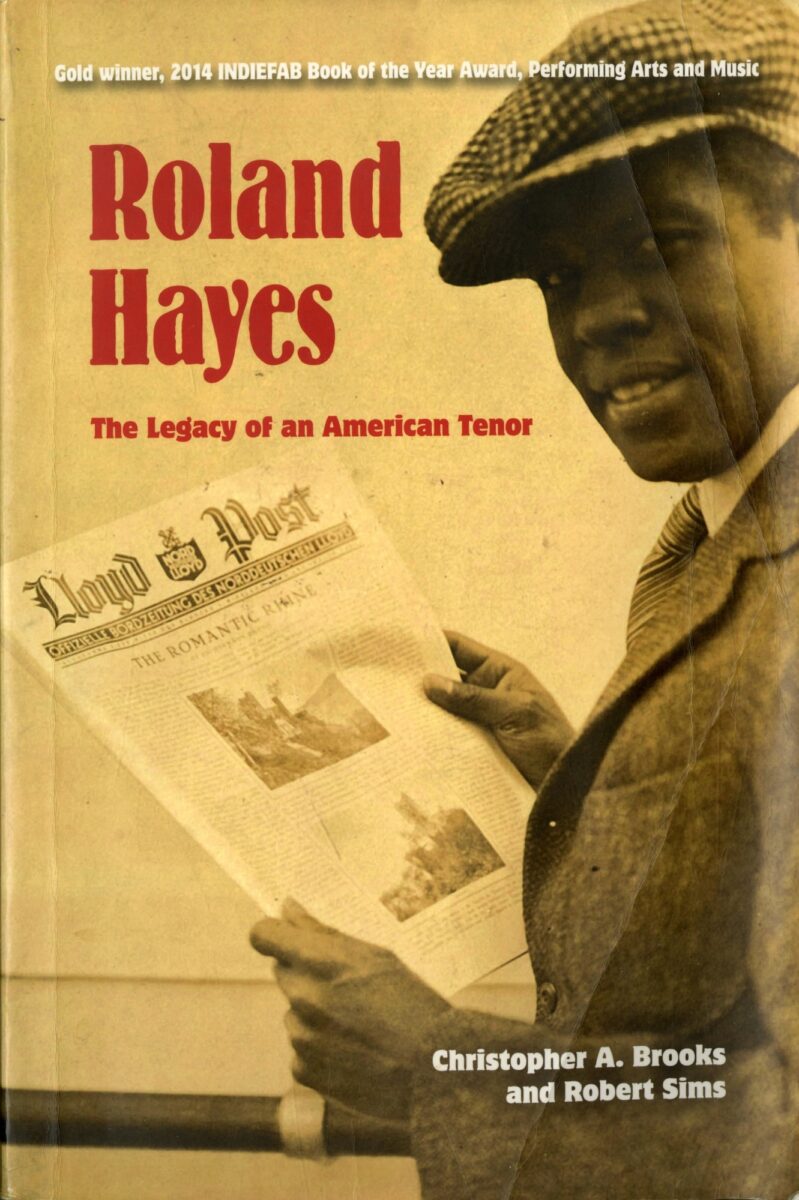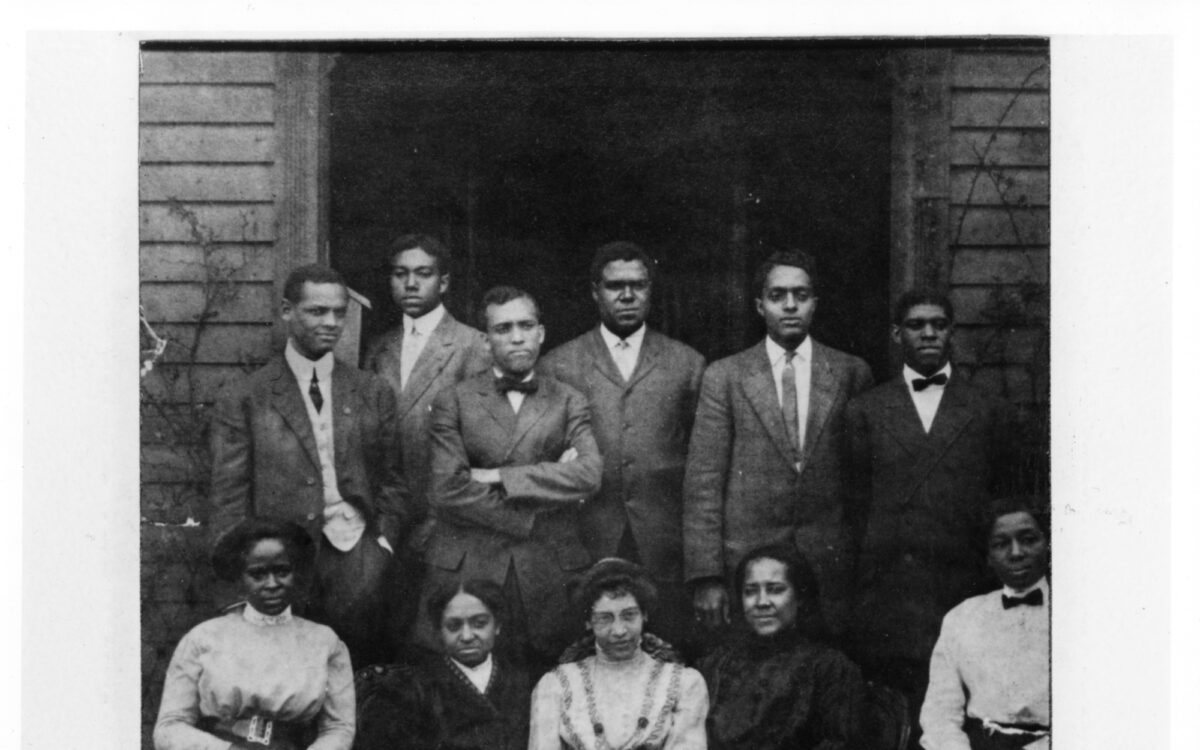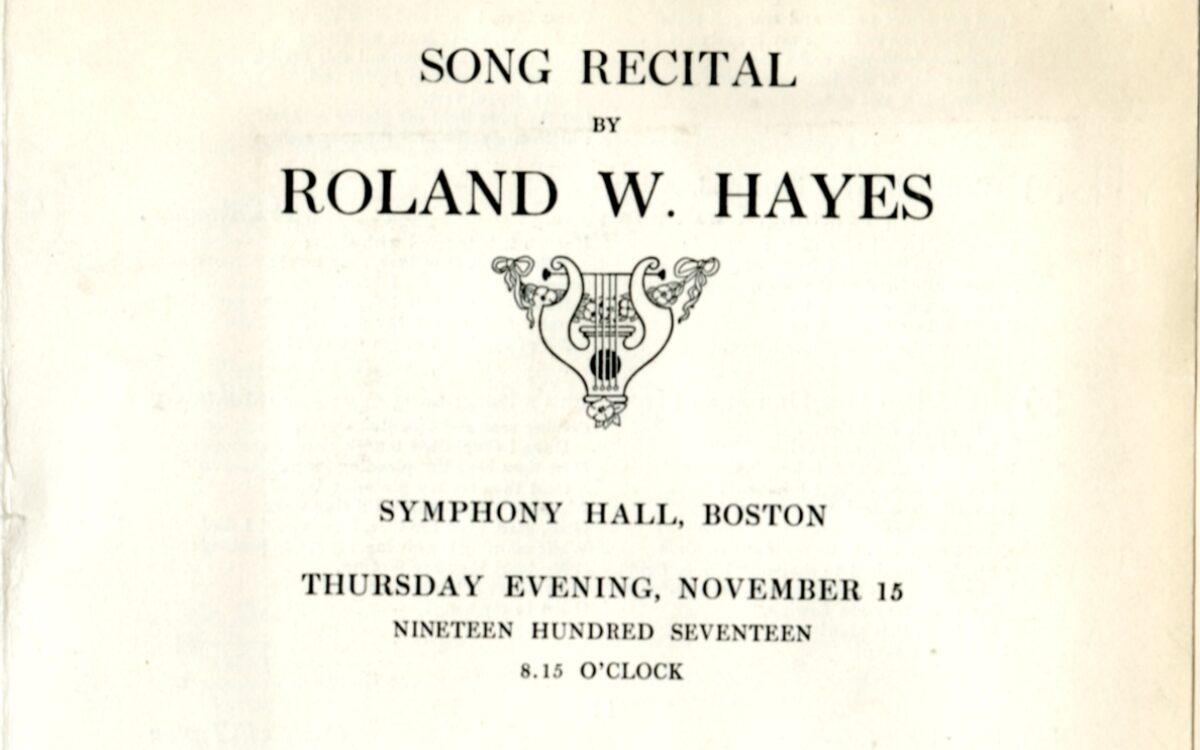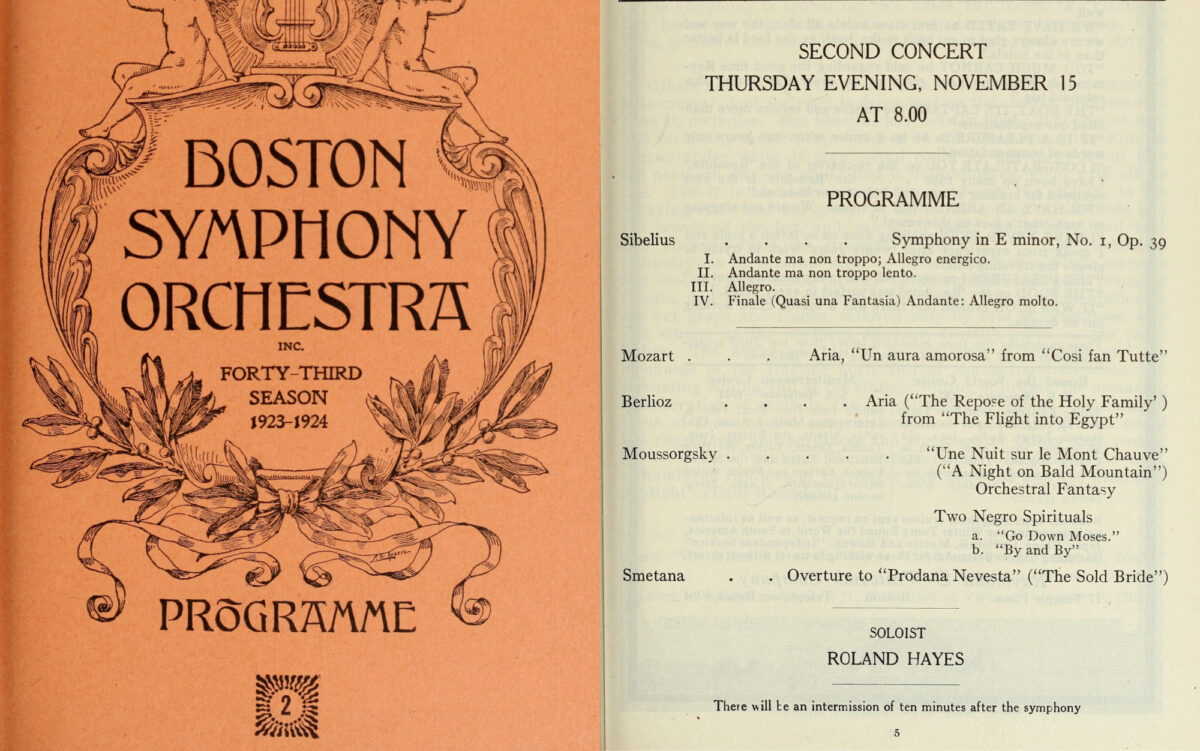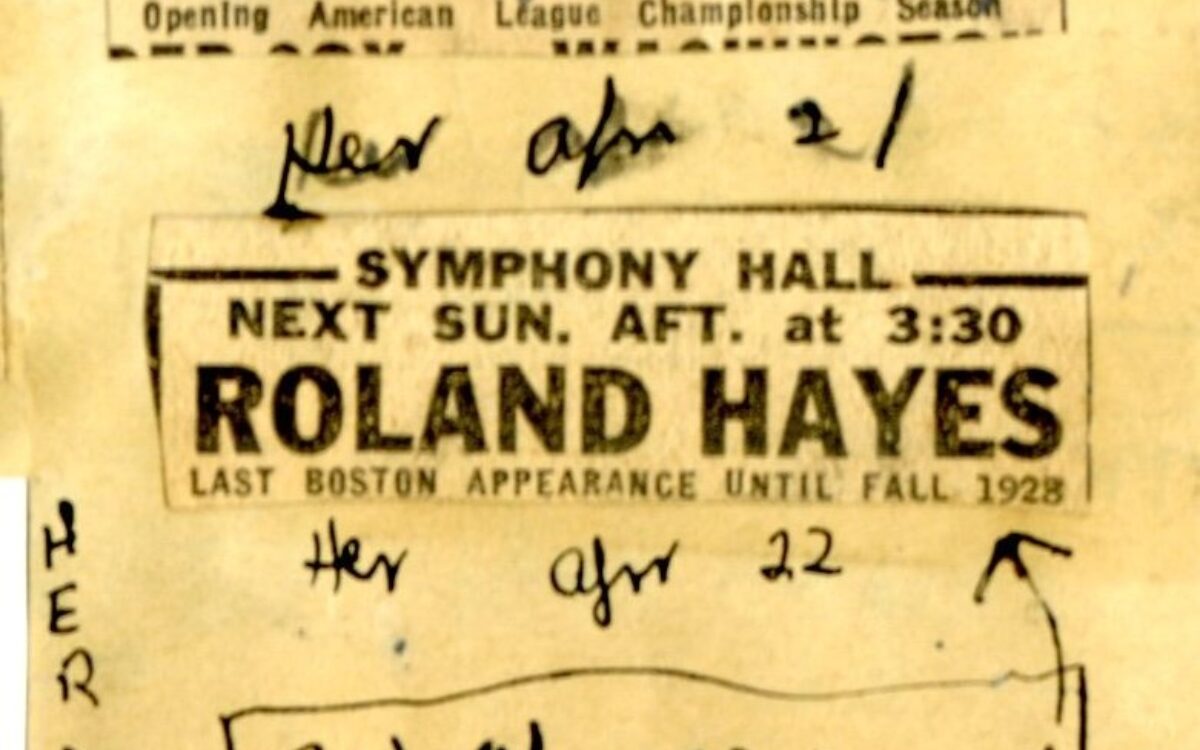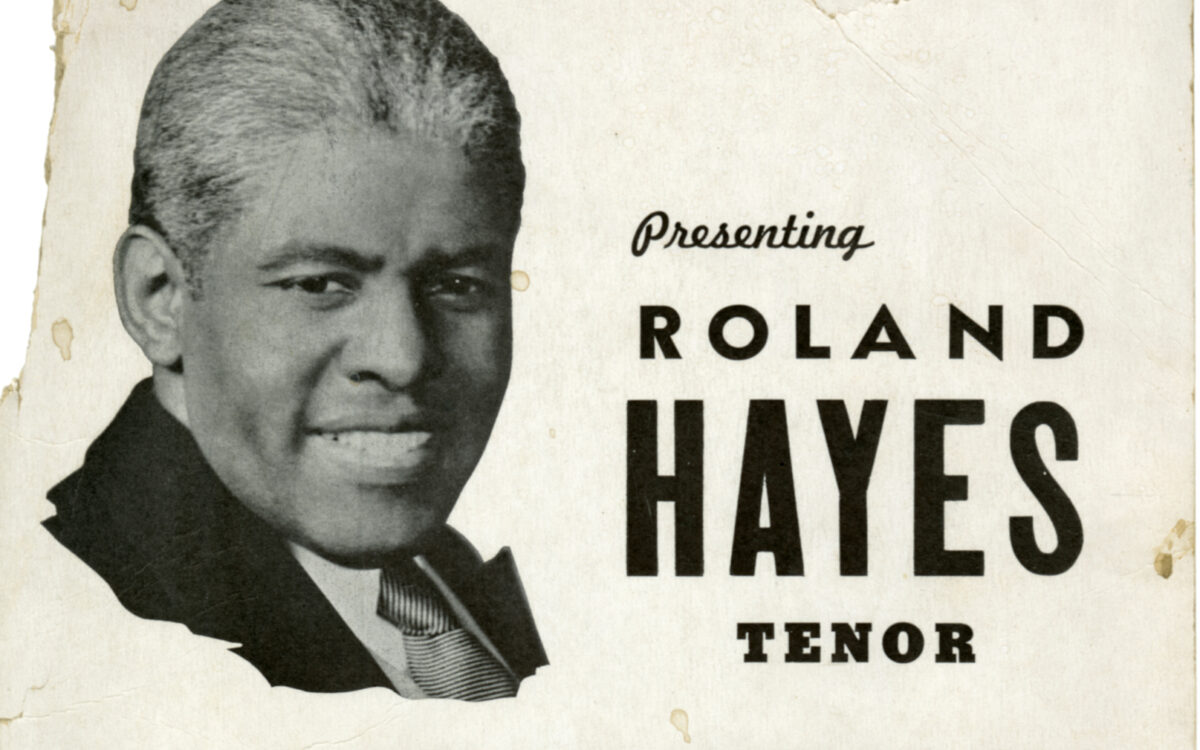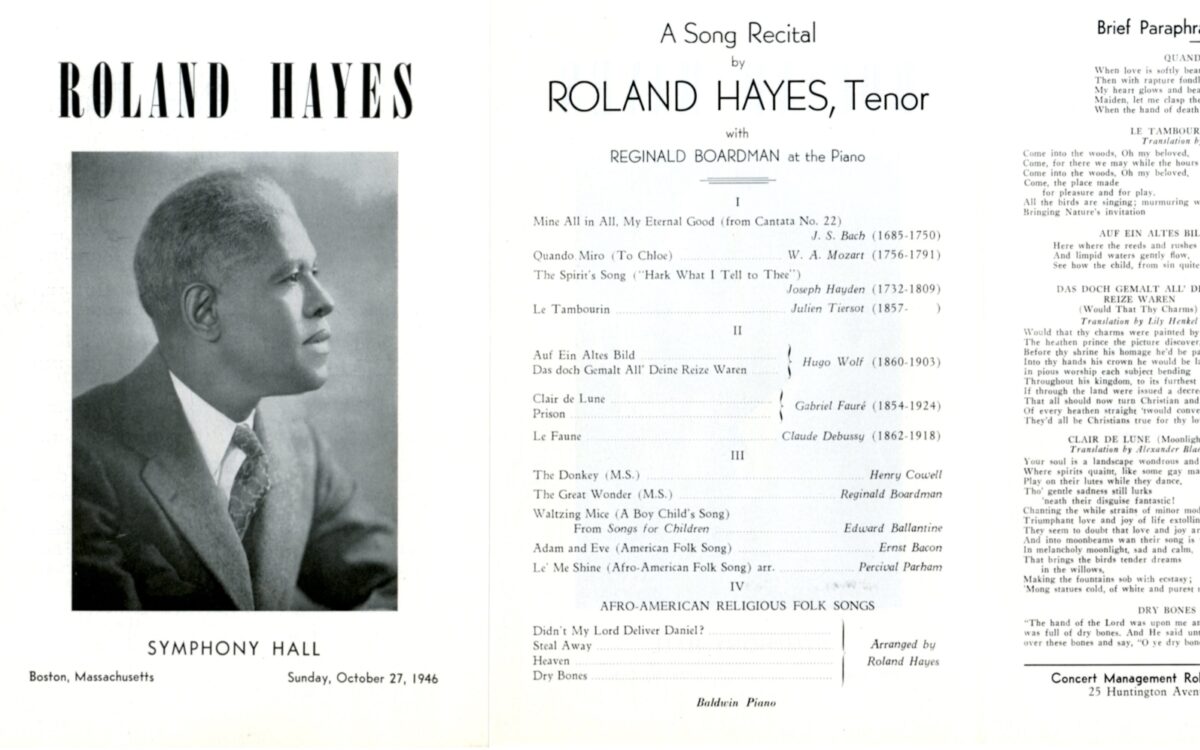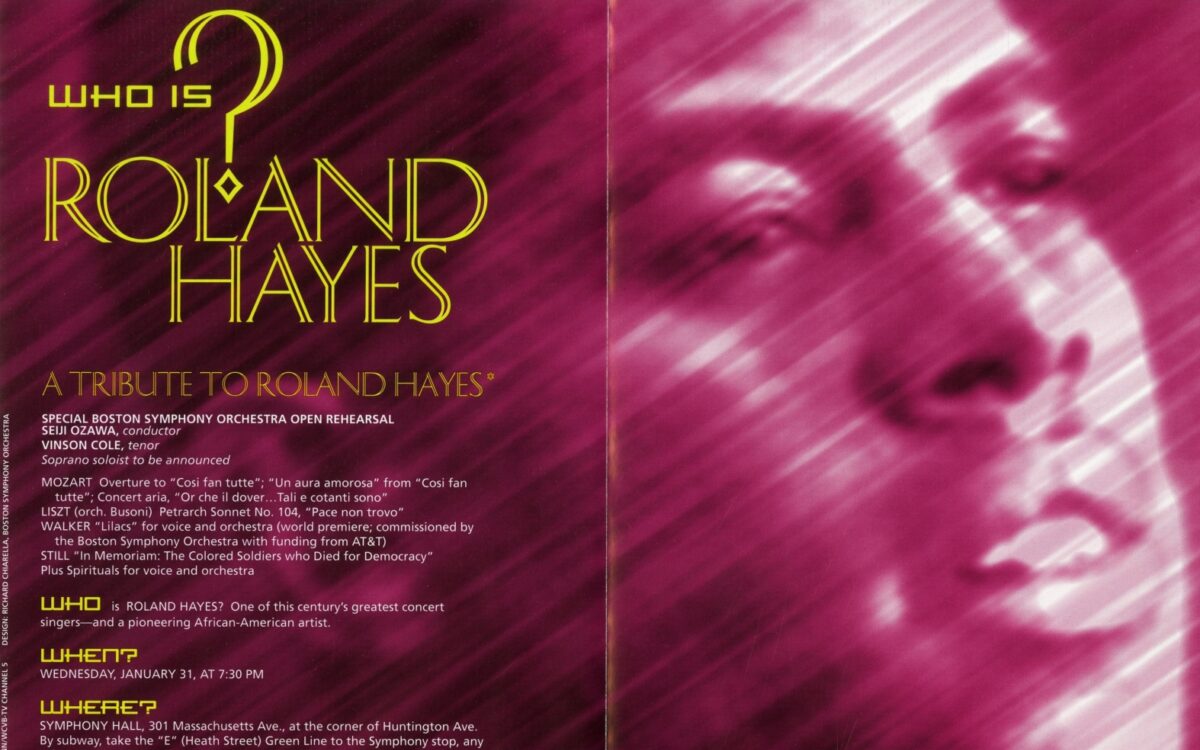A Century of Song: Roland Hayes and the Boston Symphony Orchestra
One hundred years ago, on November 15, 1923, Roland Hayes became the first Black artist to appear as a soloist with the Boston Symphony Orchestra. Over the next 20 years, he would appear with the BSO ten times. He also rented Symphony Hall numerous times, appearing on stage as a solo recitalist a total of 39 times, from 1917 to 1955. Explore these photos, letters, clippings, programs and audio that document Roland Hayes' relationship with the BSO.
"Roland Hayes, as the leading African-American concert singer from the 1920s to the 1940s, single-handedly broke the "color line" in classical concert music, paving the way for future generations of African-American artists. During his early singing career, the all-encompassing humanity of his music provided no protection against racism, but his steadfast vision of bringing people of all races together through his music eventually overrode the prejudices of audiences and concert promoters, opening the doors of concert halls everywhere. Paul Robeson, Marian Anderson, and others following in Hayes' footsteps achieved permanent recognition; but Hayes’ name gradually receded from the pages of history."
(Quoted from Robert C. Hayden’s essay “Roland Hayes: The Heart of the Song,” written originally for the compact disc, “The Art of Roland Hayes,” produced by the Smithsonian Collection of Recordings, 1990)
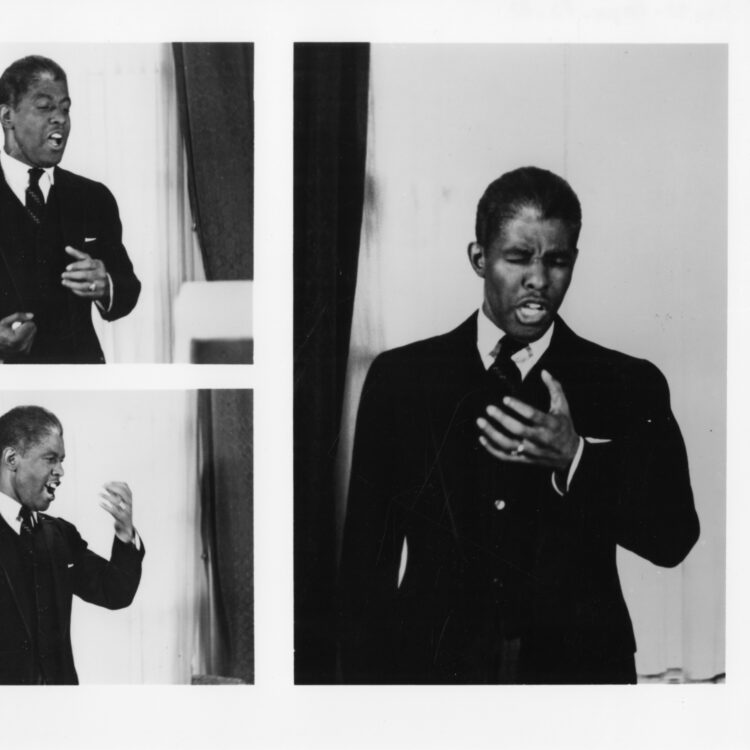
American tenor Roland Hayes (b. 1887–d. 1977)
Photographer unknown
Boston to Europe and back again to Boston
Roland Hayes originally came to Boston on tour with the Fisk Singers in 1911 and decided to stay in Boston to establish his career. Next, wishing to research his own roots and the roots of African American music, he departed for Africa in April 1920 by way of London and Paris, but he ended up staying in Europe as his career flourished there. It was in England that former BSO conductor George Henschel would coach Roland Hayes, and in Paris that the current BSO conductor Pierre Monteux would encounter Roland Hayes and invite the tenor to perform with the orchestra.
The Fisk University Jubilee Singers ca. 1911, with tenor Roland Hayes standing in the back on the far right
Although Roland Hayes did not sing with the group while a student at Fisk University, in 1911 he was invited to join the ensemble on a trip North to an exhibition in Boston.
Photographer unknown, courtesy of the Trustees of the Boston Public Library
Roland Haye’s Symphony Hall debut, November 15, 1917
Following his critically acclaimed but financially unsuccessful Boston concert at Jordan Hall in November of 1916, Hayes immediately set out to raise money for another concert to take place in Symphony Hall the following year. At the time no professional managers were willing to take him on as a client and so he did his own concert management and promotion, paid $400 to rent Symphony Hall, and printed and sold tickets himself. His hard work and perseverance paid off: every seat in the Hall was taken and 700 people were turned away.
Roland Hayes and Sir George Henschel (the BSO’s first Music Director, 1881-1884) in England
Roland Hayes left Boston for Europe in 1920 for further study and to establish himself as a concert singer abroad. From 1922 to 1929 he studied off and on with Sir George Henschel, a prominent singer and voice teacher, and the BSO's first conductor. They became great friends.
April 4, 1955, letter from Roland Hayes to Pierre Monteux, thanking him for the opportunity to perform with the BSO in 1923
Pierre Monteux (BSO Music Director 1919-1924) heard Roland Hayes sing in Paris during the summer of 1922 and immediately began to organize his appearance with the BSO, which took place during the 1923-1924 Season.
Program for Roland Hayes’s BSO debut, November 15, 1923, at Sanders Theater in Cambridge, MA
Roland Hayes performed as a soloist with the BSO ten times between 1923 and 1944 under the baton of Pierre Monteux and Serge Koussevitzky in Boston, Cambridge, Providence, Brooklyn, and New York.
Listen: Clip of Roland Hayes performing the Benedictus from Gretchaninoff's Missa Oecumenica with the BSO and Serge Koussevitzky on February 26, 1944 (Armed Forces Disk)
A great career: solo recitals in Symphony Hall
Program cover for a Roland Hayes recital at Symphony Hall on November 20, 1919
Advertisements for upcoming Roland Hayes recital at Symphony Hall on April 24, 1927
Poster advertising Roland Hayes recital in Symphony Hall, March 23, 1944
Program for Roland Hayes recital in Symphony Hall on October 27, 1946
Concert program for Roland Hayes' last recital in Symphony Hall on October 23, 1955
The concert was also dedicated to the United Nations.
A Boston Tribute to Roland Hayes in 1996
Collaborating with several Boston-area organizations, the Boston Symphony Orchestra organized a citywide tribute to Roland Hayes in February 1996. In addition to producing an educational program about Roland Hayes entitled "The Quiet Hero" for distribution at Massachusetts Public Schools, the BSO put on a concert featuring Roland Hayes' repertoire performed by tenor Vinson Cole and the world premiere of George Walker's "Lilacs for Voice and Orchestra," performed by Faye Robinson. Roland Hayes' daughter and granddaughters attended the tribute.
Seiji Ozawa, tenor Vinson Cole, and composer George Walker, look over the score to Walker's "Lilacs for Voice and Orchestra" at Tanglewood, 1995 in preparation for the BSO's tribute to Roland Hayes in February 1996.
The work would eventually be performed by soprano Faye Robinson, with Vinson Cole performing repertoire commonly performed by Roland Hayes during the tenor's recital career.
Photograph by Walter H. Scott
Curtain call bows following the world premiere of George Walker's "Lilacs" at Symphony Hall, February 1, 1996
Shown left to right are soprano Faye Robinson, composer George Walker, and conductor Seiji Ozawa, during the Roland Hayes Tribute Concert series in February 1996.
Photograph by Miro Vintoniv
Backstage at the BSO Tribute to Roland Hayes, February 1, 1996
Pictured left to right: Zaida and Erika Lambe (Roland Hayes' granddaughters); Seiji Ozawa; and Afrika Hayes Lambe (Roland Hayes' daughter).
Photograph by Miro Vintoniv
Flyer advertising the open rehearsal for the BSO's tribute concert to Roland Hayes in February 1996
The flyer also includes a listing of other Roland Hayes-themed events occurring as part of the city-wide collaboration organized by the BSO. Participants included the Museum of Afro American History, the Boston Public Library, the Isabella Stewart Gardner Museum, Boston University, and New England Conservatory.
Roland Hayes' Legacy Today
During the Boston Symphony Orchestra's Festival of Loss, Reckoning, and Hope in Spring 2023, WBUR ran a segment on the Roland Hayes' anniversary, interviewing singer Barbara Walker and conductor Thomas Wilkins.
To Learn More...
